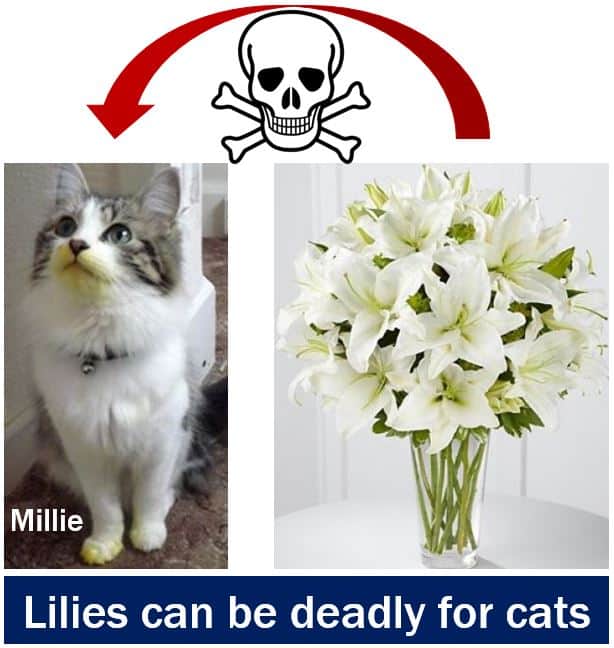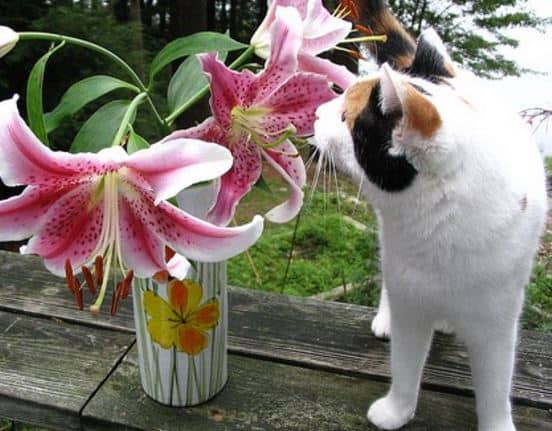Lilies are very popular at Easter, but did you know that they are deadly for cats? If a cat drinks water from a vase containing lilies, it could die. Even just licking the lily leaves or a tiny amount of pollen could prove fatal for our feline friends, according to Vets Now, an British organization with 53 out-of-hours clinics that provide round-the-clock emergency services for pets.
On its website, Vets Now wrote:
“Hundreds of cats have been admitted to Vets Now’s out-of-hours clinics and 24/7 pet emergency hospitals as a result of coming into contact with the flowers.”
“Vets are warning lilies are so toxic just licking their leaves or even drinking water contaminated with their pollen could have potentially fatal consequences.”
 Lily pollen made Millie – the cat in the image above – extremely ill. Fortunately, she received treatment in time and is making a full recovery. (Image of Millie from vets-now.com)
Lily pollen made Millie – the cat in the image above – extremely ill. Fortunately, she received treatment in time and is making a full recovery. (Image of Millie from vets-now.com)
Pollen from lilies made one cat very ill
Millie, a cat from Wickham Bishops in Essex, had to be put on an IV drip at a Vets Now clinic in Witham after licking just the pollen from the lily flowers. Her paws and mouth were stained yellow after licking the pollen. Fortunately, vets say Millie is on the mend and will make a full recovery.
Just at the Vets Now clinics, approximately three cats are treated each week for lily toxicity. There is usually an increase in cases around Easter time, when the flowers are most popular.
Dr. Dave Leicester, who heads Vets Now’s Clinical Intelligence Unit, explained:
“We see a 50% rise in pet emergency cases around this time of year and often it’s due to cats and dogs eating things they shouldn’t such as lilies and chocolate Easter eggs. Lilies are particularly poisonous to cats. They can cause severe diarrhoea, convulsions, acute kidney failure and even death.”
“What makes them particularly dangerous is that all parts of the plant are toxic and even small ingestions, such as two or three leaves or petals, or water from a vase containing lilies, can be potentially fatal.”
 Do not let your cat get near any lily plants – they are extremely toxic for them. (Image: petsci.co.uk/health-care)
Do not let your cat get near any lily plants – they are extremely toxic for them. (Image: petsci.co.uk/health-care)
“In fact, even very small amounts of pollen can be extremely dangerous. Cats can swallow a toxic amount just by grooming after brushing against the flowers. Lilies are so dangerous we’d call on cat owners never to have them in their house.”
Lily poisoning – signs and symptoms
If your cat has lily toxicity (lily poisoning), the signs and symptoms will develop with two hours. A lack of energy and vomiting are the two most likely signs.
If your pet appears to recover, still keep an eye on it. If there is kidney failure, it could begin to deteriorate rapidly over the next 24 hours. The following could be warning signs of kidney failure:
– excessive drinking
– excessive urination
– damage to the nervous system
“One of the most immediate symptoms of lily poisoning is the sudden onset of vomiting. In addition, cats that are experiencing lily poisoning will often exhibit signs of depression, diarrhea, dehydration, and lack of appetite (anorexia).”
“If the condition is left untreated, death can occur within four to seven days of ingestion (sooner if the cat consumes a larger amount of the plant).”
Video – Lily toxicity
This Pet Poison Helpline video explains that the severity of lily toxicity depends not only on how much the cat has consumed or been exposed to, but also the type of lily plant. Lilies do not all pose the same degree of danger to cats.
